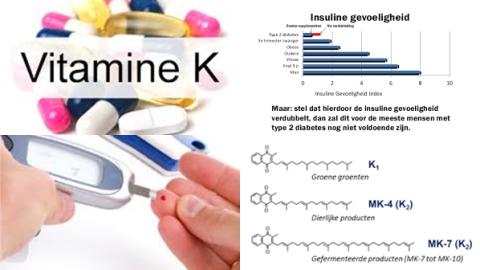Vitamin K supplementation does not reduce diabetes

Objectives:
Clinical trials of vitamin K supplementation have reported conflicting results on its effect on insulin sensitivity. Therefore, this meta-analysis (systematic review) has been conducted.
Does vitamin K supplementation improve insulin sensitivity?
Study design:
This review article included 8 RCTs involving 1,077 participants. A wide variety of participants were enrolled, including older men, postmenopausal women, prediabetic premenopausal women and participants with a history of diabetes, hypertension, or vascular disease.
The number of participants ranged from 42 to 452. The study duration varied from 4 weeks to 3 years.
5 RCTs evaluated vitamin K1 ranging from 500 to 1,000 µg/d. 2 RCTs used vitamin K2 (MK-4) 1.5 and 45 mg/d and 1 RCT assessed vitamin K2 (MK-7) 100 µg/d.
All the studies were regarded as high quality.
Heterogeneity was detected in the meta-analysis.
Results and conclusions:
The investigators found that vitamin K supplementation had no effect on homeostasis model assessment of insulin resistance (HOMA-IR), fasting plasma glucose (FPG) and fasting plasma insulin (FPI). The pooled mean difference = -0.14, [95% CI = -0.35 to 0.07, p = 0.19], 0.02 mmol/L [95% CI = -3.11 to 3.70, p = 0.86] and -0.34 µIU/mL [95% CI = -1.13 to 0.45, p =0.40] for HOMA-IR, FPG and FPI, respectively.
The investigators found that vitamin K supplementation had no effect on leptin [mean difference = 0.77 ng/mL, 95% CI = -1.32 to 2.86].
The investigators found that vitamin K supplementation failed to show a significant effect on IL-6 or CRP levels. The pooled mean differences were 0.14 pg/mL [95% CI = -0.69 to 0.97] and -0.49 mg/L [95% CI = -1.18 to 0.20] for IL-6 and CRP, respectively
The investigators found that vitamin K supplementation had no effect on adiponectin [pooled mean difference = 0.82 µg/mL [95% CI: -0.89 to 2.53].
The investigators concluded that vitamin K supplementation does not improve insulin sensitivity. Given the limited evidence available and the heterogeneity in the study results, further well-designed, large sample size randomized controlled trials are warranted. Different forms and doses of vitamin K should be explored in various populations and other surrogate markers for insulin sensitivity should be measured to better establish any beneficial effects and their clinical relevance.
Original title:
Effect of vitamin K supplementation on insulin sensitivity: a meta-analysis and Suksomboon N, Poolsup N and Darli Ko Ko H.
Link:
https://www.ncbi.nlm.nih.gov/pmc/articles/PMC5422317/
Additional information of El Mondo:
Find more information/studies on vitamin K and diabetes right here.
An improved insulin sensitivity decreases diabetes risk.